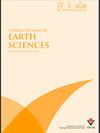2023 年 2 月 6 日卡赫拉曼马拉什大地震(兆瓦级 7.7 和 7.6)和 2023 年 2 月 20 日安塔基亚大地震(兆瓦级 6.4)的初步结果,土耳其东部
IF 1.1
4区 地球科学
Q3 GEOSCIENCES, MULTIDISCIPLINARY
引用次数: 0
摘要
.摘要:第一次 MW 7.7 级和第二次 MW 7.6 级卡赫拉曼马拉什地震是自 1939 年 MW 7.9 级埃尔津詹地震以来土耳其东部发生的最强烈的构造事件。第一次和第二次地震分别发生在东安纳托利亚断层系统的 Pazarcık 段和 Çardak 段。随后在安塔基亚断层带又发生了一次 M W 6.4 的大地震。我们总结了初步的地震数据,并分享了之前的实地观测结果,以更好地了解地震机理,并为未来的调查和布局规划提供科学依据。结合实地观测结果,我们对断层表面进行了运动学分析,并对正射影像、主震特征以及哨兵-1A 合成孔径雷达图像的差分干涉测量分析进行了调查,从而从地球科学的角度对地表变形进行了评估。结果发现,现场数据、古应力分析和变形区与近期地震的焦点机制解决方案完全一致。此外,第一次 M W 7.7 事件可能是由沿 Pazarcık 和 Amanos 地段同时发生的一次地震运动引起的。本文章由计算机程序翻译,如有差异,请以英文原文为准。
Preliminary results of the great Kahramanmaraş 6 February 2023 Earthquakes (MW 7.7
and 7.6) and 20 February 2023 Antakya Earthquake (MW 6.4), Eastern Türkiye
. In Abstract: The first M W 7.7 and second M W 7.6 Kahramanmaraş earthquakes were the strongest tectonic events in Eastern Türkiye since the M W 7.9 Erzincan earthquake in 1939. The first and second events occurred on the Pazarcık and Çardak segments of the East Anatolian Fault System, respectively. A subsequent significant earthquake of M W 6.4 occurred in the Antakya fault zone. We summarize preliminary earthquake data and share our previous field observations to better understand the mechanism and provide scientific consequences for future investigations and layout planning. After combining the field observations, kinematic analysis of fault surfaces, investigations of orthophotos, characteristics of mainshocks, and differential interferometry analysis of Sentinel-1A synthetic aperture radar images are used to evaluate the surface deformation from an earth sciences point of view. As a result, field data, paleostress analysis, and deformation zones are found to be completely consistent with the focal mechanism solutions of recent earthquakes. Furthermore, the first M W 7.7 event would have been caused by motion along the Pazarcık and Amanos segments at the same time as a single seismic
求助全文
通过发布文献求助,成功后即可免费获取论文全文。
去求助
来源期刊

Turkish Journal of Earth Sciences
地学-地球科学综合
CiteScore
2.40
自引率
10.00%
发文量
6
审稿时长
6 months
期刊介绍:
The Turkish Journal of Earth Sciences is published electronically 6 times a year by the Scientific and Technological Research
Council of Turkey (TÜBİTAK). It is an international English-language journal for the publication of significant original recent
research in a wide spectrum of topics in the earth sciences, such as geology, structural geology, tectonics, sedimentology,
geochemistry, geochronology, paleontology, igneous and metamorphic petrology, mineralogy, biostratigraphy, geophysics,
geomorphology, paleoecology and oceanography, and mineral deposits. Contribution is open to researchers of all nationalities.
 求助内容:
求助内容: 应助结果提醒方式:
应助结果提醒方式:


